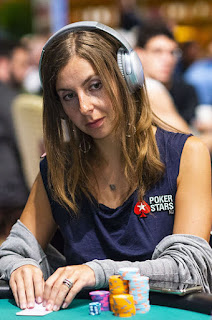Eh, even if I were the mark, I enjoyed Maria Konnikova's 2016 psychological look at poker and how she burst on the poker scene. Parts of The Biggest Bluff: How I Learned to Pay Attention, Master Myself, And Win reminded me of the WSOP-winning escapade Positively Fifth Street (2003) by James McManus.
Let's just be honest: A lot of us have some sort of dream of making a splash in the poker world, and these two books play into that.
A few things separate Konnikova and The Biggest Bluff from other rush-driven poker books. She's a woman in the testosterone, douche driven poker world, and she's got a PhD in psychology. She also hooked up with poker legend Erik Seidel as her mentor, and their relationship and his insights were definite highlights of the book.
One of Siedel's mantra's throughout the book is "less certainty, more inquiry," and I love that. I believe that guiding phrase would work in life in general, and as a recovering "know-it-all," I wholeheartedly subscribe to it.
The pacing of The Biggest Bluff kept me on my toes. The way the book progresses, Konnikova puts us in her mind through her exhilarating ride with a lot of ups, but inevitable downs. However, I must point out that about 99 percent of gambling stories are about big wins. Only 1 percent are about losses. So while the book has many more killer wins than reality, her psychological approach makes it worthwhile.
I don't buy a few things in the book, including that she knew absolutely nothing about poker before she started playing. I guess that fact doesn't matter, but it just seems that she wouldn't go into poker if she "didn't even know how many cards were in a deck." Eh, that seems like a bit of an exaggeration. But so what?When she is playing in Monte Carlo, then winning in the Caribbean, it sounds like a fantasy, and it's fun to read. Perhaps that's what poker is — representing something that isn't real. Especially in bluffs, that's what we're doing.
Could her ride be as glamorous as Monte Carlo and the Caribbean? I don't think so. I've seen poker rooms; they can be gross. And, mathematically, they're full of losers.
So I guess the big takeaway is: What is truth? I'm not suggesting that The Biggest Bluff is fiction, which it is not. But in storytelling, we reveal only what we want and what makes the best story. We don't include the sad, inevitable pain that poker ultimately is. Or is it?
I must admit I was envious of Konnikova's reality. Maybe I need to learn to master myself — and win.


No comments:
Post a Comment